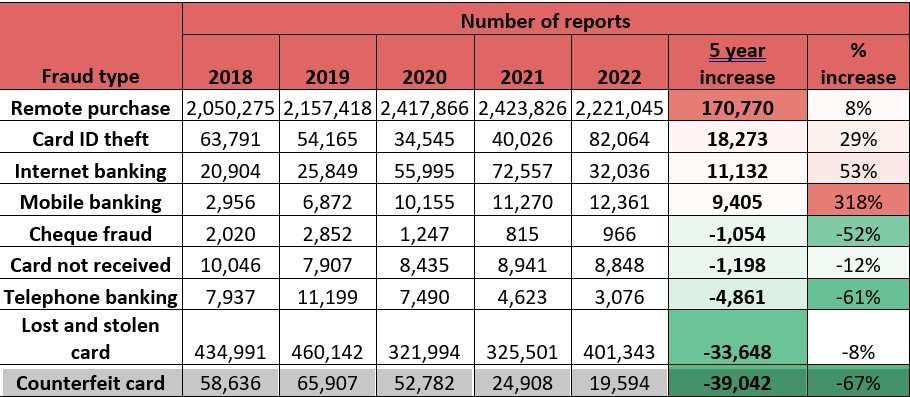We have seen a huge rise in fraud recent years. In 2023, £2.3billion was lost to fraud in the UK, with reported cases rising by 18%. But which types of fraud are rising the most quickly? And what steps can be taken to avoid falling victim?
The experts at Scams.info have studied the number of reports across a five year period to determine which fraud types are most on the rise, and which types are becoming less common.
Fraud report increases in the UK across five years:
The fraud type most on the rise in the UK is remote purchase, with a 170,770 increase (8%) in reports over the five years studied. This includes unauthorised payments made via online transactions, telephone, or mail.
2. The second biggest increase in the study was card ID theft, which includes the additional theft of personal information to open or take over a card account belonging to someone else. The yearly reports for this fraud type increased by 18,273 (29%) over the five year period.
3. Ranking third in the study was internet banking, which saw a 11,132 rise in reports; a 53% increase.
The fraud type most on the rise in percentage terms
The fraud type which showed the biggest percentage increase over the 5 year period, with reports up by a shocking 318% (9,405 increase), is mobile banking fraud.
Counterfeit card fraud is the fraud type which has shown the biggest decline, with the number of reports decreasing by 39,042 (a 67% decrease).
Lost and stolen card reports have also shown a decrease over the studied period, with 33,648 less yearly reports (-8%).
The third biggest decrease was seen for telephone banking fraud, with a 4,861 decrease in reports (-61%).
What to do if you have been a victim of fraud
Nicholas Crouch at Scams.info shares his advice for preventing fraud, as well as what to do if you believe you may have been a victim:
“One of the key steps for preventing fraud is being hyper vigilant about sharing your personal information, including your bank details. If you receive an unexpected or unsolicited call, email, or text requesting your information, always contact the supposed company directly through their public email or number to verify the request.
“With more and more cases of fraud originating from phishing emails and computer viruses, it’s vital to make sure that your computer security measures are up to scratch. Ensure your computer has up-to-date anti-virus software installed, and always be cautious of any requests asking you to enter personal details via a link.
“Essentially, it is important for you to be aware and to take action. This includes going through your bank or card statements and querying any suspicious charges, as well as questioning any unusual communications regarding payments that you don’t remember. Shredding any receipts or post with your personal information on is also a good security measure.
“If you believe you may have been a victim of fraud, you should always inform your bank who can take action to prevent further losses. You should also report the fraud to ActionFraud, the UK’s national reporting centre who work with the police to ensure your fraud report reaches the right place and is dealt with appropriately.”
















